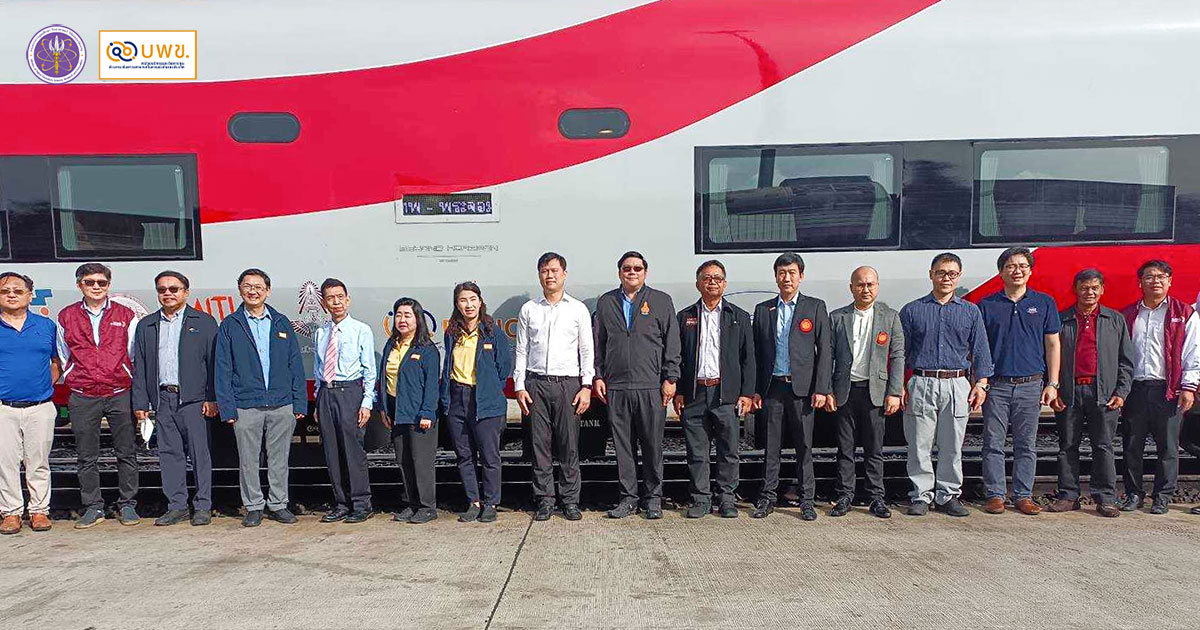
On July 3, 2024, there was a test run of the prototype passenger train “Rotfai Thai Tham” (Thai-made train) on a special route named “Sut Khop Fah” (Beyond Horizon) to evaluate its performance and inspect the operation of its equipment and control systems. The test run took place from Krungthep Apiwat Station to Chiang Mai Station.
Distinguished guests joined the initial segment of the journey from Krungthep Apiwat Station to Ayutthaya Station, including executives from the Program Management Unit for Competitiveness (PMUC), executives from the Rail and Infrastructure Research Center, Faculty of Engineering at King Mongkut’s Institute of Technology Ladkrabang (KMITL), and engineers from the State Railway of Thailand (SRT), among others.
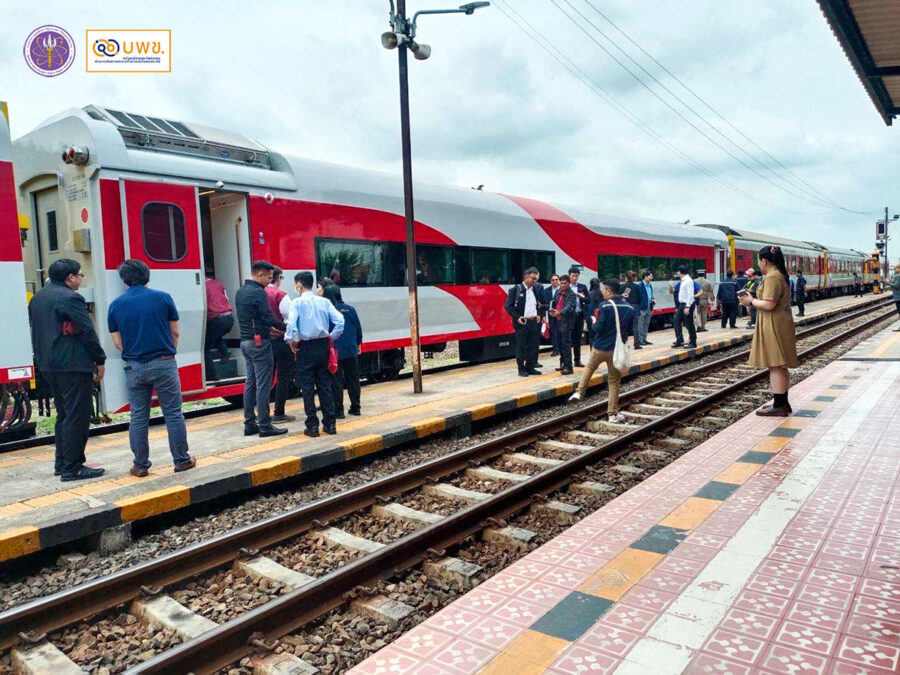
The impression upon stepping into the train carriage was the presence of amenities comparable to business class and first class on an airplane. The cabin, measuring 24 meters in length and 2.80 meters in width, contains 25 seats divided into 8 Super Luxury Class seats arranged in 2 rows of 1 seat per row, and 17 Luxury Class seats arranged in 2 rows of 1 and 2 seats per row. Modern technologies have been efficiently integrated, such as a touchscreen system that provides access to infotainment options like YouTube and Netflix. Additionally, passengers can view external temperature, PM2.5 dust levels, as well as travel position data. There is also an option to order food through a menu system, with delivery by a robot named “Nong Bokki” directly to the passenger’s seat. The train is equipped with an automatic sterilization system, internal temperature sensors, comprehensive security systems, 5G connectivity, and a vacuum toilet system, along with complete amenities. The structural components of the carriage—including walkways, stairs, etc.—all meet the performance and usage standards set by the SRT.
With the design concept of the Space Frame Modular Concept, the car’s weight is reduced, allowing the bogie to reach speeds of up to 120 km/h without generating disruptive noise. Its running, braking, and balance meet European standards. This train is a product of a research and development project that meets every objective, delivering excellent value for investment.
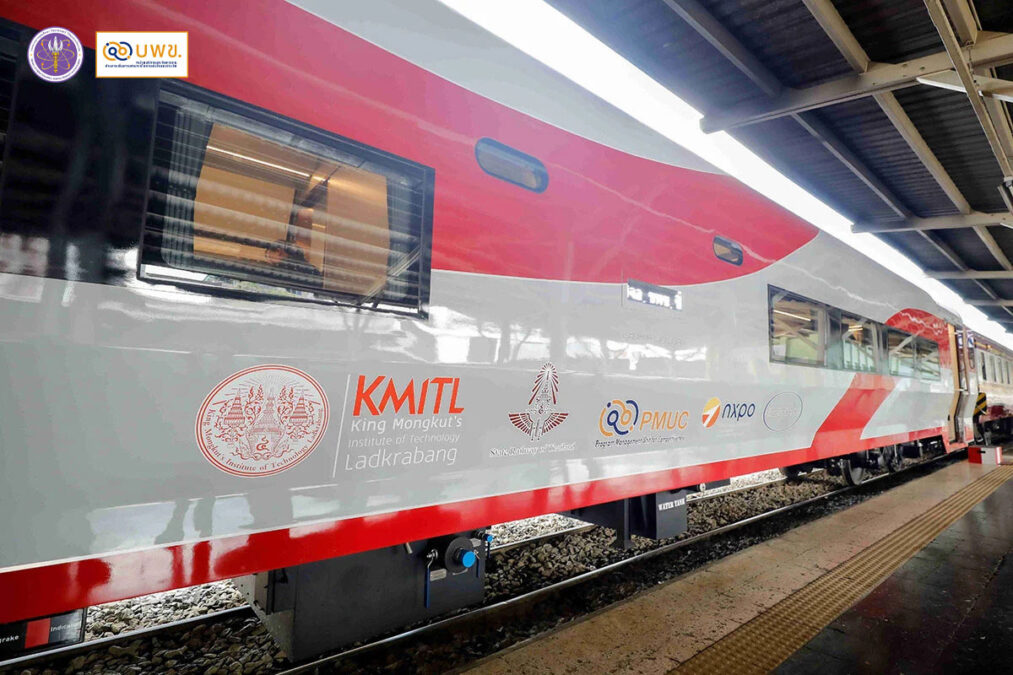
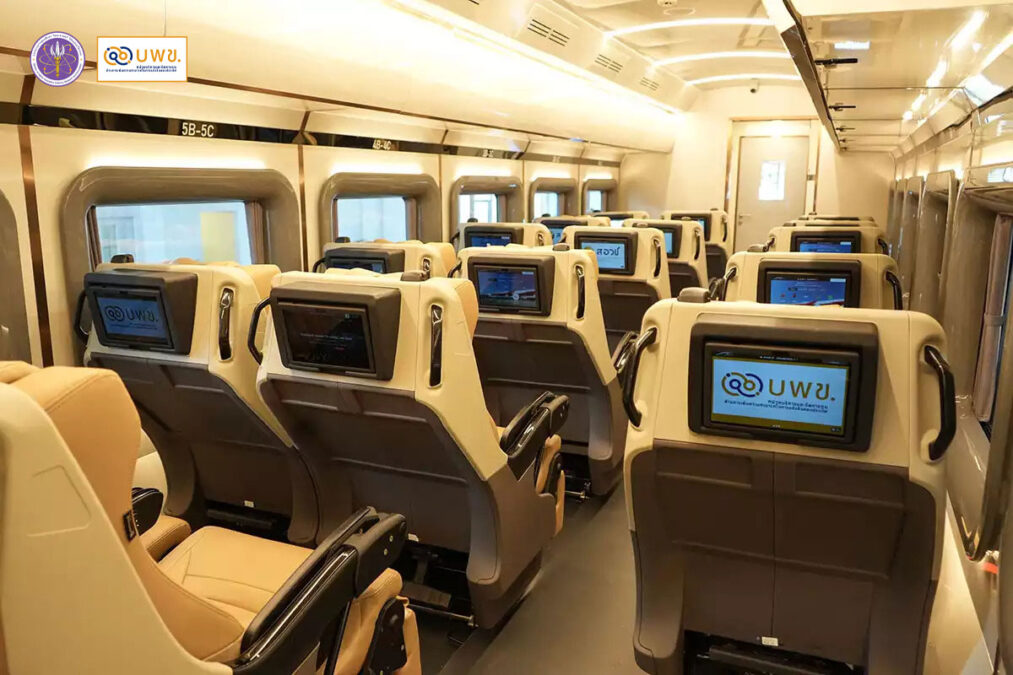
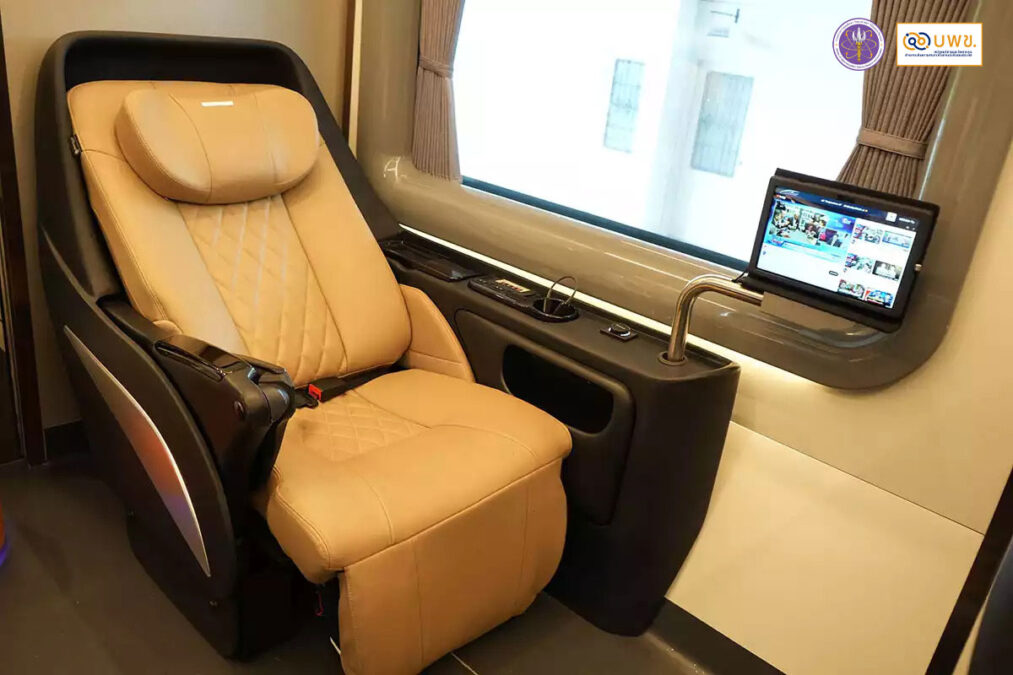
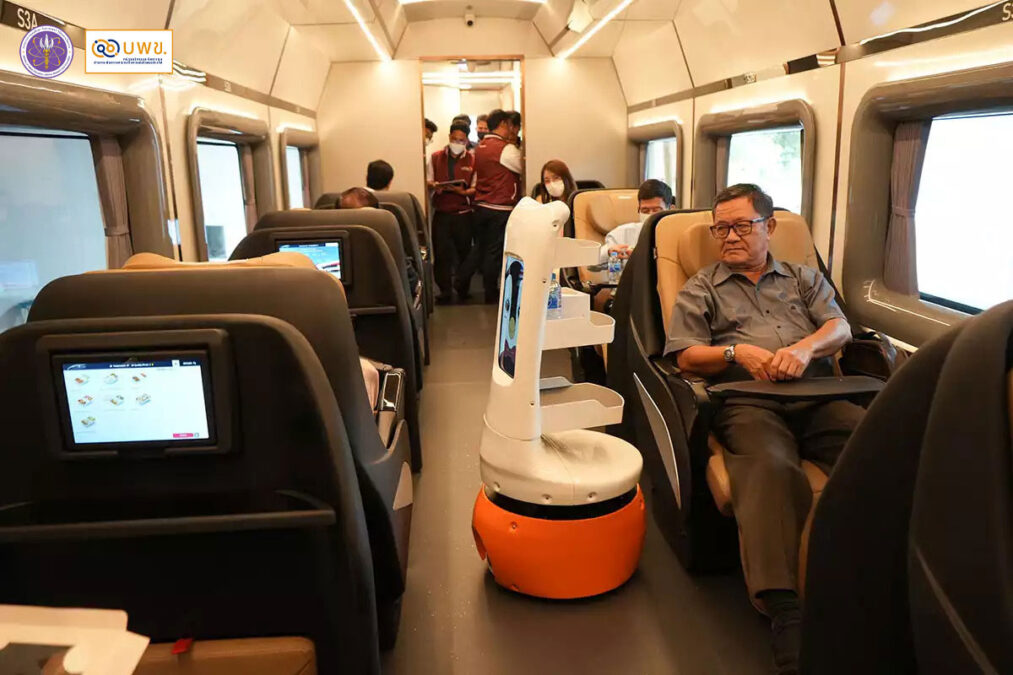
The “Rotfai Thai Tham” project involves the production of a luxurious passenger train carriage elegantly named “Sut Khop Fah” or Beyond Horizon. Its design is inspired by the business class and first class sections of airplanes and has been fully researched, developed, and manufactured 100% by Thai companies. It is Thailand’s first prototype passenger train under the “Rotfai Thai Tham” research project, adhering to the Ministry of Transport’s “Thai First” policy. The project has received research and development funding to commercialize its application from the Program Management Unit for Competitiveness (PMUC), under the Future Transportation Systems Program. This effort is in collaboration with the private joint venture SinoGen-Pin Petch Co., Ltd., which is a private sector partner in the project, while the research unit is the Rail and Infrastructure Research Center, Faculty of Engineering at King Mongkut’s Institute of Technology Ladkrabang (KMITL). After completion, the prototype passenger train will be handed over to the State Railway of Thailand (SRT) for research utilization, with the shared goal of promoting the domestic rail vehicle manufacturing industry under the principle of “self-reliance.”
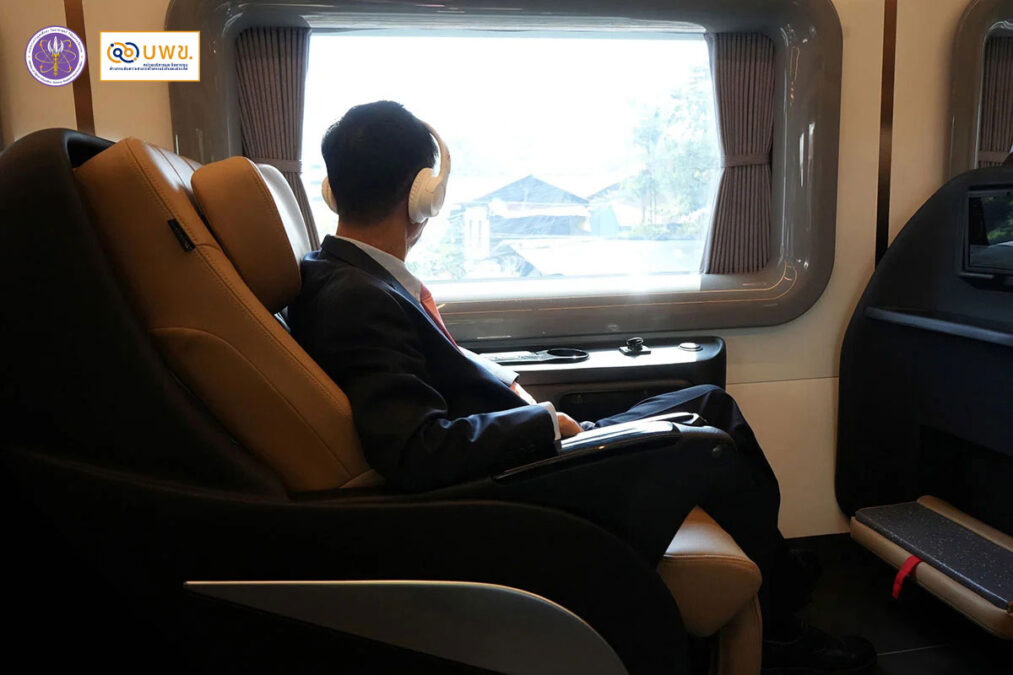
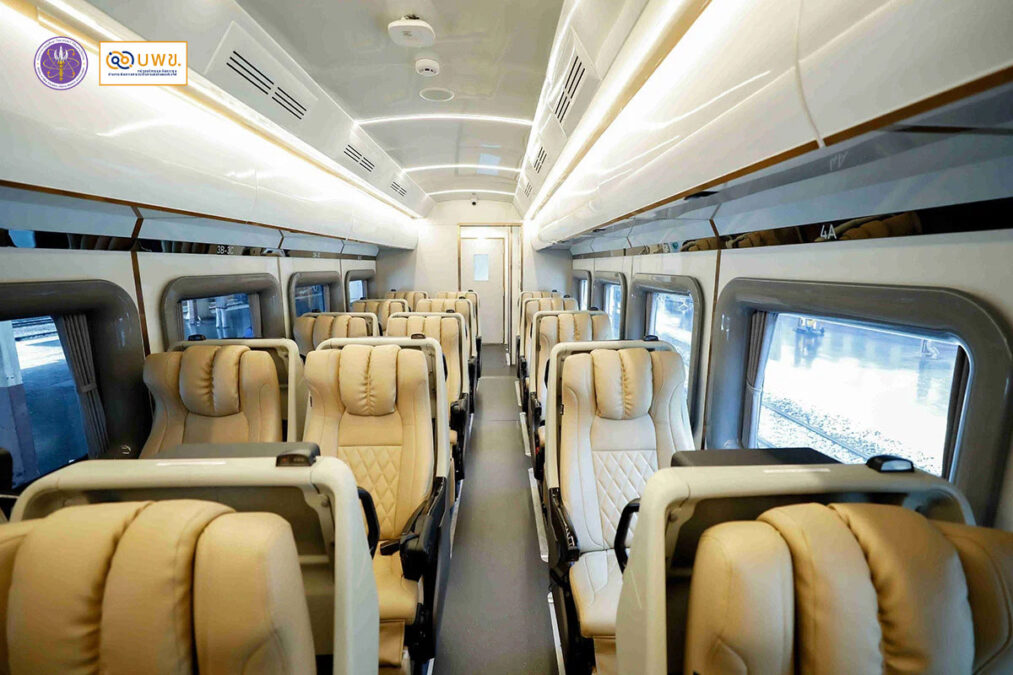
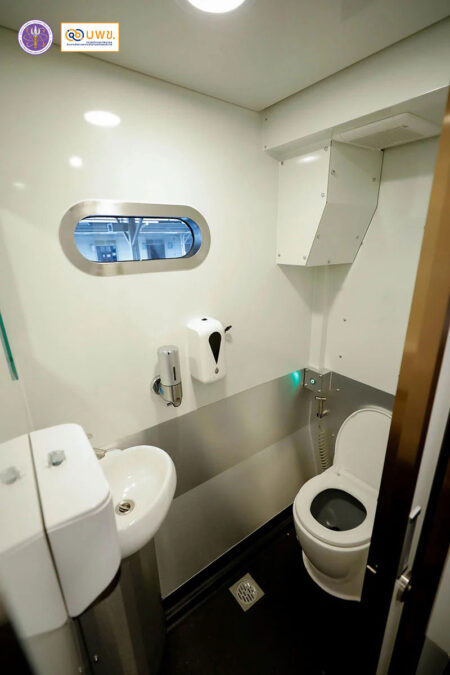
One of the primary goals of producing the “Sut Khop Fah” passenger carriage is to support the use of local materials, aiming for a local content ratio of 40%, in accordance with the Ministry of Transport’s policy, which mandates a minimum of 40%. The “Sut Khop Fah” train has achieved a local content of 44.1%. Moreover, considering only the train carriage and its components (excluding the bogie), the local content reaches as high as 76%, with over 300 related parts. The remaining 56% consists of components that require advanced technology and currently cannot be manufactured domestically, thus needing to be imported, such as the bogie, which must meet international safety standards, and the vacuum toilet system. This project has created a supply chain of more than 10 companies capable of R&D and tech localization.
The initial assessment of the expenses for developing a prototype passenger train reveals that it is at least 30% cheaper than importing. This brings both direct and indirect benefits to the State Railway of Thailand (SRT) and the nation. Additionally, it has the potential to create intellectual property in the form of patents and petty patents, achieving seven works from the target of two, which can drive the technology readiness level to TRL9 through use and testing according to international standards.
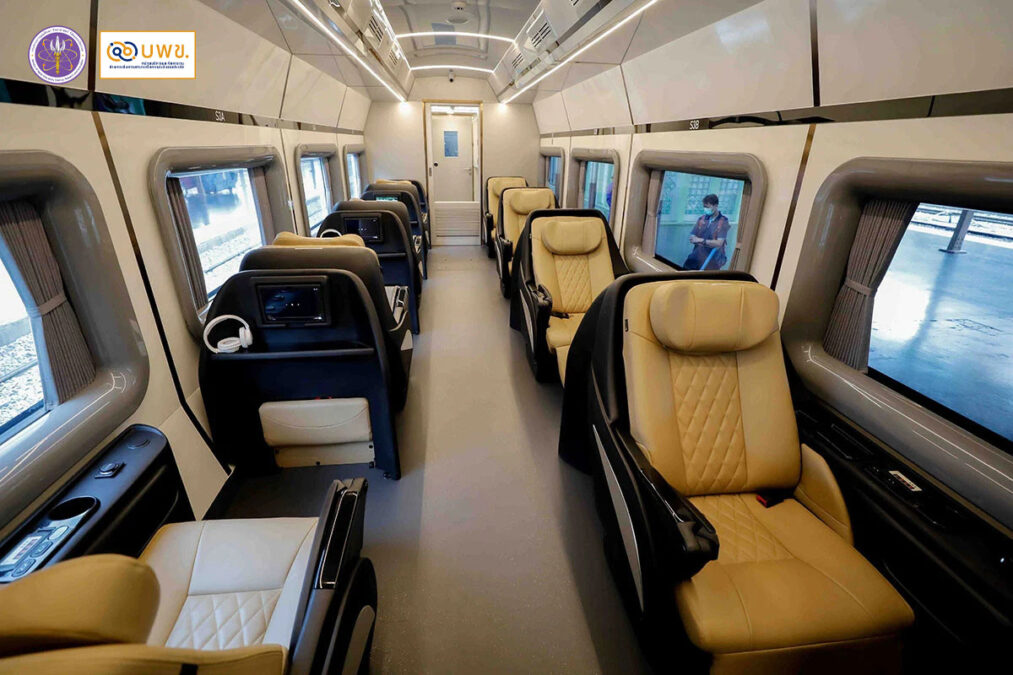
It is estimated that the “Thai-made Train” will transform SRT and create an image unlike ever before. The “Sut Khob Fah” (Beyond Horizon) carriage is a train bogie produced from research and development. The project originated from the SinoGen-Pin Petch Joint Venture, which proposed a research funding project to the Program Management Unit for Competitiveness (PMUC). The condition set by the PMUC was that the project must be developed to at least TRL4, and a researcher from a university or research agency must be part of the team. This project involved researchers from the Faculty of Engineering at King Mongkut’s Institute of Technology Ladkrabang (KMITL). It went through a rigorous screening process by PMUC to ensure that this research could be truly applied commercially, to create jobs, generate income, drive the grassroots economy, and enhance the nation’s competitiveness.
One of the aspects that gave PMUC confidence in this project was that the manufacturing team consulted with SRT, the future user, to understand what type of passenger car SRT desired and designed it accordingly to ensure that this prototype would not be created in vain.
Associate Professor Thongchai Suwansichon, Ph.D., Director of PMUC, expressed his feelings about participating in this test run: “I am impressed by the success of PMUC in supporting researchers to achieve the creation of the ‘Thai-made Train’. It is one of the successes driven by the Ministry of Higher Education, Science, Research and Innovation (MHESI), turning what was once perceived as ordinary transport into something magnificent and luxurious. It is an image that will promote rail travel for the general public and tourists. The most important thing is that it’s ‘Thai-made, Thai-used’—truly a ‘Thailand First’ initiative. This is a success that delivers results beneficial to the country and shows that collaboration between the public sector, researchers, and private enterprises enhances the nation’s competitiveness, creating tangible innovation patents. I want to thank everyone involved for bringing us to this point and showing the younger generation that research can be commercially applied, contributing to driving the country’s economy.”
One of the key concepts of the “Thai-made Train” project is to develop a luxury passenger train that can compete with airlines, attracting private car users to switch to this service for travel and tourism to generate revenue for SRT. Once SRT has revenue, it can use the funds to develop third-class trains or other types of passenger cars to provide more services to the public. Additionally, it meets environmental and sustainability objectives. Analysis shows that if 25 people switch from using private cars to riding this train, it would save energy up to eight times more than using cars or planes for the same distance and weight.
Currently, the government is investing a massive budget in railway infrastructure. However, if people do not switch from using cars or planes to trains, the invested budget would be wasted. The “Sut Khob Fah” passenger train was created to solve this problem, promoting the use of domestic materials and self-reliance without solely depending on foreign imports, potentially saving hundreds of billions of baht for the nation. For example, over 20 years, if we need more than 2,000 passenger cars, purchasing them all would cost 50 million baht per car, amounting to hundreds of billions. And it’s not just the cost of the cars; throughout their 35-year lifespan, all spare parts must be imported. But if we can manufacture them domestically, using at least 40% local materials, it means that at least 40% of spare parts would be sourced within the country throughout their lifespan. This supports the sustainability of entrepreneurs in the production chain. The SinoGen-Pin Petch Joint Venture is seen as the pioneer of this project, with other manufacturers expected to follow in the future.
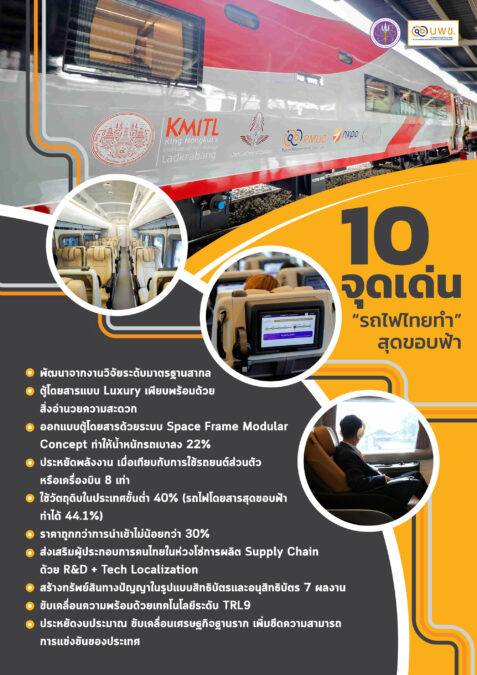
The “Thai-made Train” prototype “Sut Khob Fah” has passed service and safety standards testing by operating a long-distance route “Krungthep Apiwat-Chiang Mai” as its first test. Further tests will be conducted with SRT locomotives to ensure compatibility with other SRT train sets currently in use. Once all testing procedures are completed, the project will move to the procurement phase to provide commercial services in the near future.







